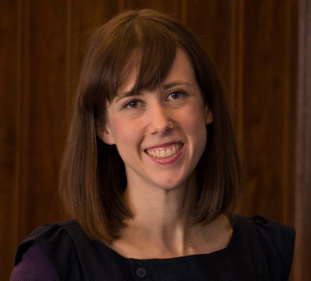Lyndsey McRae graduated in November as part of the Class of 2014 with a Bachelor of Science in Nursing. Currently working as a research assistant with Bloomberg Professor Robyn Stremler, McRae is the recipient of the 2013 Monty M. Simmonds Memorial Award and the 2014 Nora J. Greenslade Prize. She volunteers her time at The Redwood, a shelter for women and children escaping domestic violence.
Tell us a little bit about yourself and what brought you to nursing at U of T.
I knew fairly early on in life that my post-secondary journey would be related to health care. I was probably the only one of my adolescent peers to devour episodes of the Life Network television series, “Life’s Little Miracles,” profiling actual patients at SickKids. No one was surprised when I enrolled in McMaster University’s four-year BScN program. But something wasn’t quite right – it didn’t fit. I began exploring alternatives and came to learn about the Midwifery Education Program and felt a strong connection with the tenets of the profession and the midwifery practice model.
A required research course in my first year of midwifery connected me to the Health Evidence project, which I remained involved with until 2013. While at Health Evidence, I was afforded the opportunity to speak at the 2010 Canadian Cochrane Centre Symposium, and developed an awareness of the importance of review-level evidence and its translation to practice, and was exposed to the work of a Bloomberg Nursing faculty member, Dr. Ellen Hodnett. Her work on the topic of alternative labouring positions and birthing environments spoke to me and built on the enjoyment I had in providing primary care to women at all stages of pregnancy. Personal reasons forced me to leave the midwifery program before completion, but I knew that I needed to return to nursing.
I selected Bloomberg Nursing for its high-quality clinical placements, its compressed time frame, and access to renowned faculty. Most importantly, Bloomberg Nursing exposes students to a variety of clinical settings, from community health and acute care, through to mental health and paediatrics.
What are some of the challenges you face as a nurse?
Paediatric nursing, like any other segment of nursing, has its challenges, but children possess a special energy, spirit and resilience, and I feel privileged to be able to help children and their families navigate what can often be a frightening and overwhelming diagnosis, course of treatment and, at times, a daunting system. Whether working in an acute care or public health setting, being a nurse means I can support and guide children and families through these challenges and celebrate their successes. Moreover, the nursing profession accommodates my love of learning in that health care knowledge is constantly developing, which requires me to constantly seek out and adapt new knowledge.
A constant challenge is [that] limited nursing resources prevent you from providing the type of nursing care you want to provide. That said, it is important to remind oneself that advocacy at the institutional and policy levels – in addition to individual patient advocacy – is embedded in the ethical expectations set out for Ontario nurses, and may help address those very dilemmas of resource allocation.
What was the most rewarding part of your time at Bloomberg Nursing?
Working with Dr. Robyn Stremler on her research project. In providing her with data collection, study recruitment and data entry support for a variety of studies, I’ve had the opportunity to gain first-hand knowledge of the complex nuances required to perform methodologically sound paediatric-focused research. Soon I will begin working on her most recent CIHR-supported study, which is looking at the use of wearable sensors and mobile apps to promote sleep for adolescents. This kind of experience will be invaluable should I decide to embark on research projects in future as part of a graduate nursing education.
Looking back now on how you came to nursing, what are your thoughts on your return to the field?
I know now that while there were moments where I felt I had wasted time on my admittedly-circuitous path. But I also know that this time, my nursing education came from a notably different personal and academic place than it had before, and I start my practice with a new, refined, and more informed personal lens.
Your “admittedly-circuitous” route to nursing has also exposed you to other areas of health care as well. What have you learned on this journey?
Reflection is integral to nursing practice, and what I have come to identify thanks to my time as a midwifery student, with Health Evidence and most recently at Bloomberg Nursing, is my strong preference to make long-term connections with clients and to operate from a model of care that acknowledges the role of upstream health determinants on acute and/or chronic health care crises, and the importance of engaging patients in their health care decision-making. Somehow you end up exactly where you are meant to be.
